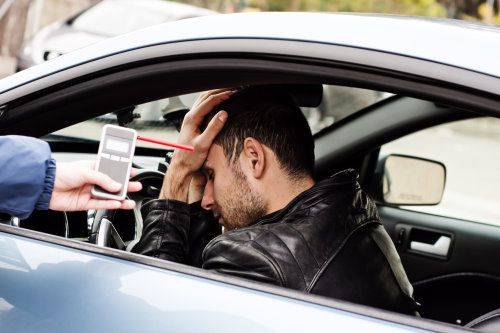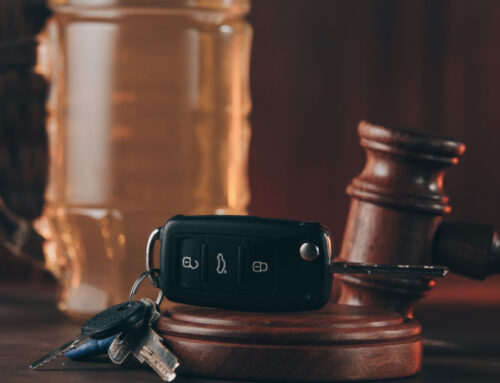When the police pull you over on suspicion of driving under the influence (DUI) in Arizona, you are required to submit to a breath test if requested to do so. This is based on the state’s “implied consent” law. Under Section 28-1321.A. of the Arizona Revised Statutes:
“A person who operates a motor vehicle in this state gives consent . . . to a test or tests of the person’s blood, breath, urine or other bodily substance to determine alcohol concentration or drug content if the person is arrested for any offense arising out of acts alleged to have been committed in violation of [Arizona’s DUI laws] while the person was driving or in actual physical control of a motor vehicle while under the influence of intoxicating liquor or drugs.”
In short, by driving on Arizona’s public roads, you automatically consent to take a breath test (or a blood or urine test) if you are pulled over for DUI. If you refuse the breath test – and thus violate Arizona’s implied consent law – you can face penalties regardless of whether you were intoxicated behind the wheel.
Here’s What You Can Expect if You Refused a Breath Test During a DUI Traffic Stop in Arizona
When you refuse a breath test in Arizona, you can face immediate consequences. Under Section 28-1321.D. of the Arizona Revised Statutes, these consequences include:
- Surrender of your driver’s license (the arresting officer can either destroy your license or file it at the police department); and,
- Loss of your driving privileges after 15 days (when the arresting officer takes your license, he or she should provide you with an “order of suspension” that serves as a temporary license that is good for 15 days).
These consequences are automatic, and they are unrelated to whether or not you were driving under the influence. For a first-time implied consent violation, you will lose your license for one year. You will receive a two-year driver’s license suspension for a second or subsequent offense (within 84 months).
If you refuse a breath test and receive an order of suspension, you have the opportunity to challenge the suspension by requesting a hearing with the Arizona Motor Vehicle Division (MVD). This is an “administrative hearing,” which is very different from a criminal trial (and, remember, if you were charged with DUI, you must separately defend against your DUI charge as well).
You have the option to hire an attorney to represent you during your administrative hearing, and you must do so. However, since this is not a criminal matter, you are not entitled to a public defender under the Sixth Amendment. During the hearing, the state has the burden of proving your implied consent violation “by a preponderance of the evidence.” This means that the state must prove that it is “more likely than not” that you violated Arizona’s implied consent law—a burden of proof that is much lower than the “beyond a reasonable doubt standard” that applies in criminal cases.
If your arresting officer shows up for the hearing, the chances of your driver’s license suspension being upheld are fairly high. However, there are ways to defend against an alleged implied consent violation even if the arresting officer testifies. For example, your attorney may be able to argue that you were illegally stopped or that the arresting officer failed to follow the necessary procedures for Arizona’s implied consent law to apply. Before your hearing, you will need to meet with your attorney and discuss the facts of your arrest in detail so that he or she can determine what defenses you have available.
If your defense is successful, then your license will be reinstated, and your driving privileges will be restored pending the outcome of your DUI case. However, if your defense is not successful, then the Arizona MDV will uphold your suspension, and you will be unable to drive unless you qualify for a Special Restricted Driver’s License (SIIRDL). You will need to pay to have your license reinstated once the suspension period is over, and you may have to pay for SR-22 auto insurance (which is extremely expensive) for three years following the reinstatement of your license.
While you can lose your license for refusing a breath test, the good news is that an implied consent violation is not a criminal offense in Arizona—as it is in some other states. As a result, you cannot be sent to jail for refusing a breath test under Arizona law. However, you could still be jailed for DUI, and there are various ways that the prosecution can prove a DUI charge even without the results of a breath test.
What Should You Do if You Refuse a Breath Test in Arizona?
Given the considerations discussed above, if you refused a breath test during your DUI traffic stop, what should you do?
- Review Your Order of Suspension – First, carefully review your suspension order to make sure you know when your 15 days are up. You must request a hearing within 15 days to have an opportunity to protect your ability to drive.
- Request an MDV Administrative Hearing – When you are charged with an implied consent violation, and MDV administrative hearing scheduling is not automatic. You must affirmatively request a hearing, and you must do so within 15 days.
- Contact a DUI Defense Attorney – To mitigate the consequences of your DUI traffic stop to the fullest extent possible, you will need to rely on the advice and representation of an experienced DUI defense attorney. It would help if you spoke with an attorney as soon as possible.
Request a Free DUI Defense Consultation in Phoenix or Tempe, AZ
Have you been charged with an implied consent violation in Phoenix or Tempe, AZ? If so, we encourage you to contact us promptly for a free initial consultation. To discuss your case with one of our experienced DUI lawyers in Phoenix in confidence, call 480-405-7922, or request an appointment online now.






